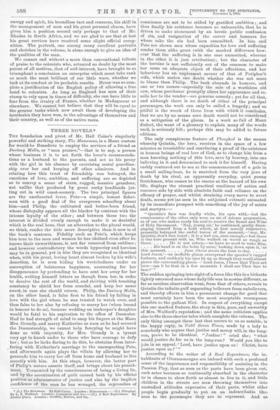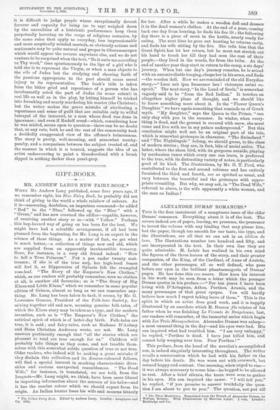THREE NOVELS.* TEE foundation and pivot of Mr. Hall Caine's
singularly powerful and striking story, The Manxman, is a Manx custom for would-be Benedicts to employ the services of a friend as Dooiney Molla, or "man praiser,"—that is to say, a person whose business it is to set forth the lover's recommenda- tions as a husband to the parents, and act as his proxy with the girl in his absence by exercising moral guardian- ship over her and keeping off other admirers. And in relating how this trust of friendship was betrayed, the emotions of love, ambition, and suffering are so depicted as to convey a sense of stern, rugged, massive grandeur, not unlike that produced by great rooky headlands jut- ting out in wild coast-scenery. The two principal figures are the uneducated lover, Pete—a simple, honest fisher- man with a good deal of the overgrown schoolboy about him—and Philip, the cultivated and better-born friend, whose disloyalty appears all the blacker by contrast with the intense loyalty of the other ; and between these two the interest is divided evenly enough to make it so doubtful which is the real hero, that an alteration to the plural would, we think, render the title more descriptive than it now is of the book's contents. Fidelity such as Pete's, which keeps him true to the man and woman he has idolised even after he knows their unworthiness, is not far removed from sublime ; and however contradictory the words hypocrisy and heroism may be in general, yet in him they are recognised as identical when, with his great, loving heart almost broken by his wife's desertion, he is seen hiding his wretchedness under an assumption of boisterous happiness, accounting for her disappearance by pretending to have sent her away for her health, writing himself letters as though from her, in order to deceive the rest of the world, and striving with touching oonstancy to shield her from scandal, and keep her name sweet, in case she should return. Philip, the Dooiney Molla, on the other hand, is false first to his friend by falling in love with the girl whom he was trusted to watch over, and then false to her also by refusing to marry her (when bound in honour to do so), because wedding an innkeeper's daughter would be fatal to his aspiration to the office of Deemster. Had he had strength of mind to snap his fingers at the Manx Mrs. Grundy, and marry Katherine as soon as he had secured the Deemstership, we cannot help fancying he might have done so with impunity, for Mrs. Grundy is a tyrant very apt to knock under to those who have courage to defy her ; but as he lacks daring to do this, he abstains from inter- fering with Katherine's marriage to the unsuspecting Pete, and afterwards again plays the villain by allowing her to persuade him to carry her off from home and husband to live secretly with him. At this stage, however, the better part of Philip's nature asserts itself, and brings about his punish- ment. Tormented by the consciousness of being a living lie, and by the accentuation of guilt caused both by his official position as administrator of justice and also by the implicit confidence of the man he ha e wronged, the reproaches of * (1.) The Harman. By Hall Onina. London, Ileinomann.—(2.) PEoughed, By L. B Walford. London: Lougman8 and Oo.—(3.) 4 IOW Ropentonce. By Austin ClIaro„ London ; Griffith, rarran, and On, conscience are not to be stifled by gratified ambition ; . and thus finally his existence becomes so unbearable, that he is driven to make atonement by an heroic public confession of sin, and resignation of the career and honours for whose sake the sin had been committed. In him and Pete are shown men whose capacities for love and suffering render them alike great (with the marked difference how- ever that the suffering is in one case unmerited, whereas in the other it is just retribution); but the character of the heroine is not sufficiently out of the common to make her seem an adequate object of their affections, and her behaviour has an unpleasant savour of that of Potiphar's wife, which makes one doubt whether she was not more to blame than Philip. The book abounds in humour, and one or two scenes—especially the sale of a worthless old cow, whose purchaser promptly alters her appearance and re- sells her to the vendor—are genuine comedy ; yet for all that, and although there is no death of either of the principal personages, the work can only be called a tragedy; and so pitiful is the wreck of three lives with which it concludes, that we are by no means sure death would not be considered as a mitigation of the gloom. In a work so full of Manx dialect, the want of a glossary to explain many of the words used, is seriously felt ; perhaps this may be added to future editions.
The only conspicuous feature of Ploughed is the means whereby Quintin, the hero, receives in the space of a few minutes so irresistible and convincing a proof of the existence in human beings of real love of God, as to change him from a man knowing nothing of this love, save by hearsay, into one believing in it and determined to seek it for himself. Having rashly ventured out to sea at the commencement of a gale in a small sailing-boat, he is snatched from the very jaws of death by his rival, an apparently everyday, quiet young Seatchman, who comes to the rescue at the hazard of his own life, displays the utmost practical readiness of action and resource side by side with absolute faith and reliance on the efficacy of prayer, and whilst straining every nerve to avert death, seems yet (as seen in the subjoined extract) animated by its immediate prospect with something of the joy of saints and martyrs :— " Quintin's face was deadly white, his eyes wild,—but the countenance of the other only wore an air of solemn preparation, as of one who makes ready his soul to receive the Bread and Wine of Holy Sacrament. 'Nay, young sir,' he continued, gently disen- gaging himself from a hold which, at first merely responsive, presently betrayed the awful terror of the moment,—' nay, Mr. Quintin, don't lose heart ; it is a bad sea, sure enough,—but there is One here present with us, Who walked on waves as rough as these. . . . . He is not asleep,—we have no need to wake Him. . . . . His hand is on the helm by mine,' looking down upon it, 'at this moment Jesus Christ steers the boat to-day Lord Jesus,'—an ineffable gleam overspread the speaker's rugged features, and suddenly his eyes lit up as though they could almost pierce the surrounding gloom—' Lord Jesus, I know that Thou art here—can it be that in a few moments I shall see Thee face to face P' " The sudden springing into sight of a force like this in a hitherto lightly esteemed man whose daily life was in nowise different, as far as careless observation went, from that of others, reveals to Quintin the infinite gulf separating believers from unbelievers, and thereby effects in him a permanent change for good that must certainly have been the most acceptable recompense possible to the gallant Niel. In respect of everything except this one marked feature, the story is thin, poor, and unworthy of Mrs. Walford's reputation ; and the same criticism applies also to the three shorter tales which complete the volume. The only thing amongst these last that occurs to us as notable, is the happy reply, in Until Seven Times, made by a lady to somebody who argues that justice and mercy will, in the long. run, prove to be identical. "Justice!" cried she; "what would justice do for us in the long-run ? Would you like to join in an appeal/ Lord, have justice upon us I Christ, have justice upon us ? ' " According to the writer of A Real Repentance, the in- habitants of Oberammergau are imbued with such a profound sense of the importance and responsibility of assisting in the Passion Play, that as soon as the parts have been given out, each actor becomes BO continually absorbed in the character he is chosen to show.forth as almost to live in it, and little children in the streets are seen throwing themselves into unstudied attitudes expressive of their parts, whilst older people begin gradually to put on an indescribable like- ness to the personages they are to represent. And as it is difficult to judge people whose exceptionally devout fervour and capacity for being (so to say) weighed down by the unrealities of a histrionic performance keep them perpetually hovering on the verge of religious ecetacies, by the same rules that apply to everyday, less impressionable and more sceptically minded mortals, so obviously actions and sentiments may be quite natural and proper in Oberammergau which would appear the reverse anywhere else, and we do not venture to be surprised when the text, "Be it unto me according to Thy word," rises spontaneously to the lips of a girl who is told she is to represent the Virgin, or when a man objects to the rifle of Judas lest the studying and showing forth of the passions appropriate to the part should cause moral injury to its representative. The book's title is taken from the bitter grief and repentance of a person who has involuntarily acted the part of Judas (to some extent) in real life as well as in the play, by letting himself be tricked into forsaking and nearly murdering his master (the Christus); but the writer makes the grave mistake of attributing a repentance and sense of guilt that are suitable only to wilful betrayal of the innocent, to a man whose deed was done in ignorance ; and even if Rudolf erred—which, considering how he was misled, seems open to question—there can be no doubt that, at any rate, both he and the rest of the community took a decidedly exaggerated view of the offence's heinousness. The story is pretty, well-meaning, and somewhat namby- pamby, and a comparison between the subject treated of, and the manner in which it is treated, suggests the idea of an artist endeavouring to paint a thundercloud with a brush dipped in nothing darker than pearl-grey.



















































 Previous page
Previous page